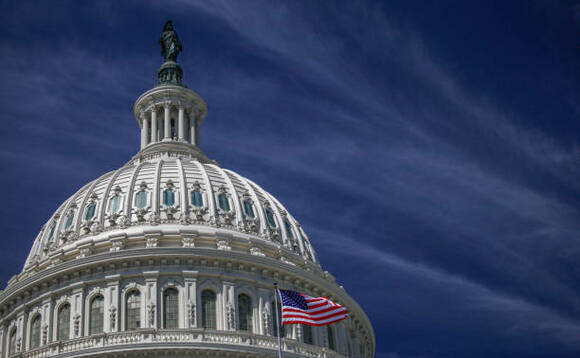US senators Sheldon Whitehouse (D-RI) and Roger Wicker (R-MS) have introduced bipartisan legislation strengthen federal due diligence and transparency requirements to include certain American professionals such as investment advisers, attorneys and accountants.
In a statement on 3 October, the bipartisan senators offered the legislation as an amendment to the defense authorization bill set for consideration in the Senate later this year.
The senators' 'Establishing New Authorities for Businesses Laundering and Enabling Risks to Security (ENABLERS) Act' would strengthen federal due diligence and transparency requirements to include these American professionals.
Six Representatives attached similar legislation to the House version of the National Defense Authorization Act.
Whitehouse said: "This bipartisan measure would require basic transparency in a number of professions that bad actors seek out to hide their ill-gotten gains. We already expect that kind of transparency from many institutions, like our banking system. I'm pleased we've arrived at a sensible, bipartisan solution to address this threat."
"Vladimir Putin's barbaric invasion of Ukraine has exposed the deep reach of oligarchs and kleptocrats who have used their wealth and influence to drive global conflict," Wicker said. "The United States should be doing everything within reason to root out this corruption and keep foreign bad actors from exploiting our financial system. This legislation would put that abuse in the crosshairs by requiring greater transparency in certain industries to help protect our country."
Several journalistic exposés—like the Pandora Papers, which was released one year ago today (3 October)—have shown how easy it is for kleptocratic regimes, drug cartels, and other bad actors to hide illicit funds in the United States with the help of American professionals.
According to a report by the investigative organization Sentry, the U.S. is among the last 10% of countries not to have implemented the necessary transparency and due diligence solutions included in the ENABLERS Act, and - as the U.S. Department of the Treasury has acknowledged - America is currently one of the best places in the world to "hide and launder ill-gotten gains."
In a separate move on 29 September this year, the Financial Accountability and Corporate Transparency (FACT) Coalition said it welcomed the Treasury Department's release of the first final rule to implement the landmark Corporate Transparency Act and urged the Treasury Department to accelerate the remaining rulemaking processes to fully implement this ground-breaking anti-money laundering reform.
The rulemaking brings the U.S. one step closer to casting off its reputation as the world's top financial secrecy jurisdiction, it said in the statement.
"The release of this first final rule is a historic moment in the decades-long fight to rid the U.S. of dirty money," said Ian Gary, executive director of the FACT Coalition.
"Anonymous shell companies help kleptocrats and criminals around the world park assets and commit crimes in our country. The U.S. has fallen behind many jurisdictions in requiring the true owners of corporate and other entities to be disclosed.
"Congress did its part almost two years ago by passing the Corporate Transparency Act, and we urge the Treasury Department to finish the regulatory process to fully implement the law as soon as possible."
In February, the FACT Coalition submitted a series of detailed comments in response to a proposed rule released by the Financial Crimes Enforcement Network (FinCEN), the financial crime fighting agency tasked with implementing the law.
The FACT Coalition further said it is conducting a thorough analysis of the final rule to understand the changes made in response to the hundreds of comments received during the rulemaking process.
"While we are still analyzing the final rule, it is important to emphasize the benefits of full and faithful implementation of the Corporate Transparency Act. With information on the true owners of anonymous shell companies, law enforcement agencies, financial institutions, and our allies will be able to effectively combat corruption and money laundering," Gary said. "Faithful implementation will not only benefit the global financial system and U.S. foreign policy objectives. It will also benefit ordinary Americans who are harmed by drug trafficking, human trafficking, and other crimes enabled by anonymous shell companies."
Further rulemakings will cover issues such as rules to govern access to the beneficial owner directory to be established by FinCEN. Timely, uncomplicated access to the information in the U.S. directory must be provided to all actors contemplated by the law. This includes partner jurisdictions involved in foreign and transnational investigations, such as those in pursuit of the assets of Russian oligarchs.
"While being behind other jurisdictions with public disclosure of beneficial owners, the U.S. also has a chance to learn from experience. Information on the true owners of entities supplied to FinCEN under this law must be reliably verified to avoid the problems we've seen in other jurisdictions," Gary said. "Our beneficial ownership directory should deploy real-time and automated verification mechanisms to ensure an accurate and useful database."
"The timely implementation of the Corporate Transparency Act is absolutely critical to fulfilling U.S. commitments on global anti-corruption, especially in the lead up to the International Anti-Corruption Conference slated to be in Washington this December," said Tom Cardamone, President and CEO of Global Financial Integrity, a FACT Coalition member.
"But as FinCEN has told Congress, its ability to deliver a timely rule hinges on its resources. As Congress punts on approving a budget for the next fiscal year, it should understand the consequences of keeping our nation's financial crime fighters underfunded. Congress should fully fund FinCEN at $210.3 million for next fiscal year to make sure the bureau has the staff, technology, and resources it needs to protect the U.S. financial system."





